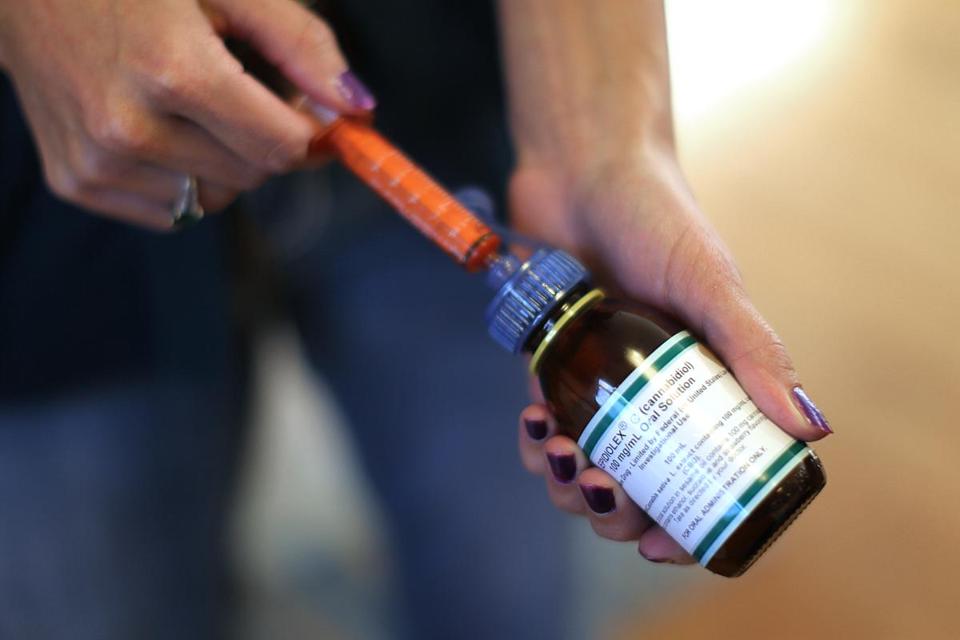Carly’s Law study at UAB finds medical marijuana oil helps epilepsy patients

It’s official: cannabidiol, or CBD oil, oil derived from marijuana plants, helps reduce the number of seizures in patients with treatment-resistant epilepsy. That’s according to findings by the University of Alabama at Birmingham (UAB) released earlier this month. CBD oil, which contains little of the “high-inducing” chemical THC, came into the Alabama lexicon with the passage of “Carly’s Law,” in 2014 after piece of legislation provided the UAB Epilepsy Center and Children’s of Alabama the ability to conduct clinical trials of cannabidiol, a component of cannabis. Starting in 2015, UAB launched the landmark study, which focused on 132 patients, 72 children and 60 adults, with intractable epilepsy who did not respond to traditional therapies. “The study analyzed data from the 132 patients at baseline and at visits at 12, 24 and 48 weeks. Seizure frequency decreased from a mean of 144 seizures every two weeks at baseline to 52 seizures over two weeks at 12 weeks into the study. The reduction remained stable through the 48-week study period,” wrote Bob Shepard at UAB. “This is a highly significant reduction in the number of seizures that the majority of patients experienced, nearly a two-thirds reduction across the entire study population,” said Martina Bebin, M.D., professor in the Department of Neurology in the School of Medicine and principal investigator of the pediatric arm of the study. “Some patients experienced an even greater reduction of seizure frequency.” The investigators also noted parallel decreases in both seizure severity and seizure frequency, indicating that, for many patients, use of CBD oil led to both fewer and less intense seizures. UAB research makes national impact Thanks in part to the research coming out of UAB, on June 25, the U.S. Food and Drug Administration (FDA) approved Epidiolex® for seizures associated with two rare and severe forms of epilepsy, Lennox-Gastaut syndrome and Dravet syndrome, marking the first FDA approval of a purified drug derived from cannabis. “This approval serves as a reminder that advancing sound development programs that properly evaluate active ingredients contained in marijuana can lead to important medical therapies. And, the FDA is committed to this kind of careful scientific research and drug development,” said FDA Commissioner Scott Gottlieb, M.D. “Controlled clinical trials testing the safety and efficacy of a drug, along with careful review through the FDA’s drug approval process, is the most appropriate way to bring marijuana-derived treatments to patients. Because of the adequate and well-controlled clinical studies that supported this approval, prescribers can have confidence in the drug’s uniform strength and consistent delivery that support appropriate dosing needed for treating patients with these complex and serious epilepsy syndromes.”
UAB provides first results of ‘Carly’s Law’ study

The University of Alabama at Birmingham released results from its Cannabidiol Program study, which was created to test the efficacy and tolerability of CBD oil, a marijuana-derived medicine with only trace amounts of the high-inducing chemical THC meant to assist in the quelling of seizures. According to the results, half of the 51 patients saw sustained improvement of seizure control – specifically a 32 to 45 percent decline in seizures depending on the dose. Two patients were seizure-free at the end of the study and nine others were forced to drop out due to side effects or ineffectiveness. Currently, 49 children and 30 adults are enrolled in the studies. “The studies are ongoing, and we have a lot more to learn; but these preliminary findings are encouraging,” Jerzy Szaflarski, M.D., Ph.D., professor in the Department of Neurology and principal investigator of the adult study said in a press release. “Among our goals was to determine the safety of CBD oil therapy, and it appears that, in many cases, patients tolerate the oil quite well. The evidence of seizure reduction gives us hope that, the more we learn about CBD oil, the better we will be able to tailor this therapy to provide relief for those with severe epilepsy.” The study began in April of 2015 after the legislature unanimously passed “Carly’s Law” the year before. While the legislation approved the study of the CBD oil on patients with intractable seizures, it has drawn the ire of many CBD supporters who complain that the studies aren’t inclusive enough. “Leni’s Law,” sponsored by Rep. Mike Ball (R-Madison), seeks to decriminalize the oil at the center of the UAB studies in order to make it more readily available to desperate citizens throughout the state. The law’s namesake, Leni Young, and her family fled Alabama to seek relief in Oregon. Despite having been on the front lines of the push to pass “Carly’s Law,” Leni was left out of the initial study. While the medication that Leni receives is slightly different from CBD oil, or more specifically the epidiolex being given to patients in the “Carly’s Law” studies, she has improved by leaps and bounds since moving to Oregon. UAB’s results will be described at the annual American Academy of Neurology meeting in Vancouver, Canada, which takes place April 15 through 21.


